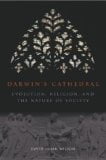 Darwin’s Cathedral: Evolution, Religion and the Nature of Society
Darwin’s Cathedral: Evolution, Religion and the Nature of Society
by David Sloan Wilson
Chicago University Press, ISBN 0-226-90134-3
Wilson argues that the social phenomenon of religion can best be explained using evolutionary theory. A well-known, if controversial, attempt applies the concept of the meme as a cultural replicator. However, Wilson’s approach is unlikely to find favour with those of us who look to Dawkins for the clearest and most persuasive evolutionary arguments, and not just because it is not memetic.
In the disputes within evolutionary theory about the unit of selection, Wilson is a long-standing exponent of group selection, a heterodox view, at least in the UK, for about thirty years. Dawkins, whose selfish gene theory nominates the gene as the fundamental unit, argues that group selection explanations muddle clear thinking, even though group selection may occur. Since Wilson’s argument about religion rests on group selection theory, the reader must figure out what that theory’s status is.
It looks muddled to me. For Wilson, individuals and groups (p. 9) and genes (p.18) are all things which evolve, not just species. It is unclear, though, how groups replicate and are selected, whereas of course they may change, persist or perish in ways that may not require evolutionary explanations.
Wilson’s conclusions on religion will probably not charm the skeptic. He favours the coexistence of religious and scientific thought, and goes so far as to demote the very faculty skeptics hold dear:
“Rationality is not the gold standard against which all other forms of thought are to be judged. Adaptation is the gold standard against which rationality must be judged, along with all other forms of thought.” (p. 228).
Thus, if a religious belief in, say, miracles helps a group to adapt and persist, then this becomes its justification, despite any criticism we might bring to bear. This is not far from saying that religion ought to be believed because it is useful.
Paul Taylor


